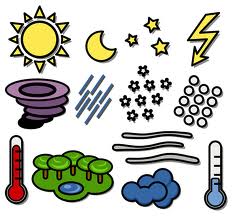|
Teacher Page A WebQuest for 4th Grade Weather Designed by Ms. Manning
Introduction
| Learners
| Standards
| Process
| Resources
| Evaluation
| Conclusion
| Credits | Student Page
This lesson was developed as an introduction lesson to a weather unit. It is designed for my work sample for my placement at Tobias Elementary. Students will be able to discover various forms of weather through online resources. Students will use the sites to learn about weather elements that happen in the Northwest, specifically Oregon. This lesson is designed for a fourth grade science lesson on weather. It involves researching and interpreting the text and illustrations to gain knowledge. This lesson could be extended and used up to sixth grade. Learners do not need any prior experience, other than directions on how to use a WebQuest.
Curriculum Standards This lesson is used as an introduction to a weather unit. Students will be able to identify many weather elements and characteristics. The only standard this WebQuest specifically covers is the use of reading and interpreting information through the use of technology: 4.RI.7 Interpret information presented visually, orally or quantitatively (e.g., in charts, graphs, diagrams, time lines, animations, or interactive elements on Web pages) and explain how the information contributes to an understanding of the text in which it appears. Students will be immersed in many sites tailored to help children learn about weather. Students will gather information and make sense of it, but connecting it to their own experiences. This will help students make the information meaningful and relevant to their lives.
In
order to become a
Weather Wiz the following steps must be taken: 1.
Recieve your worksheet
from Ms. Manning and write your name on it. 2.
Any Weather Wiz has to
know the difference between weather and climate. Weather is what it is
like outside at a given time or day. Explain what the difference is
after you research what climate is. 3.
Please pick at least 2
weather elements to study as a meteorologist and write or draw what you
learned on your worksheet:
4.
Here in Oregon, we all
know water or precipitation loves to fall from the sky. Write and
define at least 3 types of precipitation. Name and label them on your
worksheet. 6.
Now that you are a
Weather Wiz, take a shot at being a meterologist.
Try to predict the weather or report it. This WebQuest is done in one class period or time block. This lesson is used as part of a unit. It is not meant to be a stand alone, as students will need more practice and repitition in learning about weather elements and characteristics. Students will do this quest individually. I anticipate that students will not fully understand how to predict or report the weather, but the activity at the end of the process is a great activity for experience. Teachers need to know how to use the WebQuest and should have prior experience using each website. That way if students need help then teachers can answer their quesitons. Variations It is important for children to discover for themselves. This is why students should each have their own computer and manipulate the materials for themselves. Again, this lesson should not be used as a stand-alone lesson. In order to truly gain a comprehensive understanding, students will need more information to form meaningful concepts.
In order to implement this lesson, teachers need to reserve time in the computer lab. (Unless the class is going to do this quest together in their own classroom.) Each student will need their own computer, and address for the website. This can be retrived on a word document placed on the desktop of each computer. Sites used: Weather Wiz Kids is a site specifcally designed to learn about all things surrounding weather, each element and characteristic is on this site that children are able to comprehend. http://www.weatherwizkids.com/ Kids Geo lays out the types of precipitation in an easy to read format. There is also more indepth information on other forms of precipitation. http://www.kidsgeo.com/geography-for-kids/0114-precipitation-types.php This site made by the University of Illinois is a very interative and engaging site. It allows all students and ablilties to read through the information. It's text is easy to read, has pictures to go along with it and is read aloud to you if you wish to hear it. It encompasses all learners. http://urbanext.illinois.edu/treehouse/index.cfm A chance to predict and report the weather is what children will have the opportunity to do at this site. Very fun and engaging, students will learn a lot. http://www.edheads.org/activities/weather/ Students will be evaluated on the worksheet they turn in. The rubric used is layed out on the student page. The main goal of this is to get students immersed in weather elements and excited them for the rest of the unit. Students will be able to discover many weather elements within the framework of the WebQuest. Hopefully students will be engaged and want to learn more about weather--this quest is a starting point to learn all about weather. Auto
Biographer: Last updated on Jan., 2012. Based on a template from The WebQuest Page |
